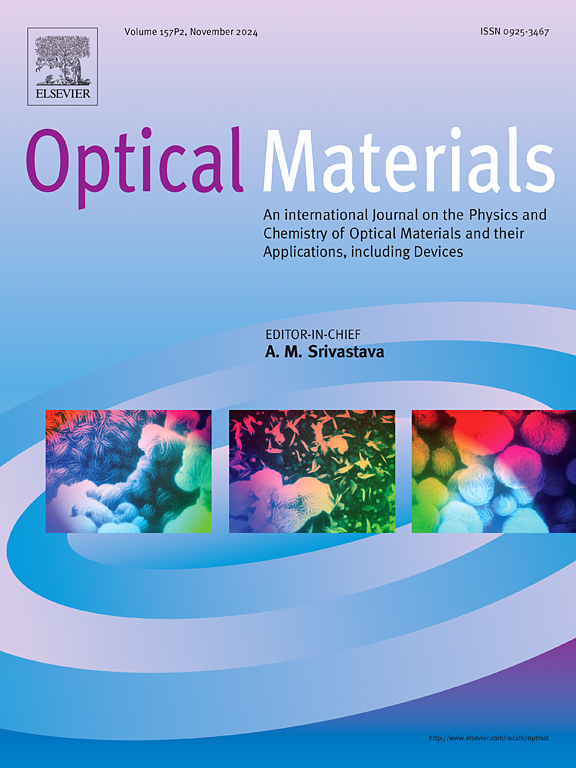Optical properties and energy transfer of Tm3+ single-doped and Tm3+-Tb3+ co-doped transparent glass-ceramics containing NaGd(MoO4)2 single phase
IF 3.8
3区 材料科学
Q2 MATERIALS SCIENCE, MULTIDISCIPLINARY
引用次数: 0
Abstract
Tm3+ single-doped and Tm3+-Tb3+ co-doped SiO2–B2O3–Na2O–ZnO–MoO3-Gd2O3 glasses were successfully prepared by the melt-quenching process. X-ray diffraction and transmittance measurements were used to determine that the optimal heat treatment regime consisted of crystallization at 620 °C for 5 h and transparent glass-ceramics containing the NaGd(MoO4)2 single phase were obtained. The characterization results by SEM confirmed that the size of the crystals precipitated in the glass matrix was on the nanometer level. The effects of different contents of Tm2O3 on the luminescent properties of glass-ceramics in this system were explored. The results showed that the emission peak at 453 nm (1D2→3F4) had the highest intensity when Tm2O3 was doped with 0.5 mol% under the wavelength at 359 nm excitation. In addition, with the gradual increase of Tb2O3 contents, the luminescence colour of the Tm2O3–Tb2O3 co-doped glass-ceramics gradually shifted from blue to green. This indicates its potential application in blue-green light display technologies and various other areas. The experimental results of the water resistance stability of the samples show that the co-doped glass-ceramic still has good luminescence stability after being immersed in water, which provides further favourable support for its application.
含 NaGd(MoO4)2 单相的 Tm3+ 单掺杂和 Tm3+-Tb3+ 共掺杂透明玻璃陶瓷的光学特性和能量传递
通过熔淬工艺成功制备了单掺 Tm3+ 和 Tm3+-Tb3+ 共掺 SiO2-B2O3-Na2O-ZnO-MoO3-Gd2O3 玻璃。通过 X 射线衍射和透射率测量,确定了最佳热处理机制为在 620 °C 下结晶 5 小时,并获得了含有 NaGd(MoO4)2 单相的透明玻璃陶瓷。扫描电子显微镜的表征结果证实,玻璃基质中析出的晶体尺寸为纳米级。研究人员探讨了不同含量的 Tm2O3 对该体系中玻璃陶瓷发光特性的影响。结果表明,在波长为 359 nm 的激发波长下,当 Tm2O3 的掺杂量为 0.5 mol% 时,453 nm 处(1D2→3F4)的发射峰强度最高。此外,随着 Tb2O3 含量的逐渐增加,Tm2O3-Tb2O3 共掺玻璃陶瓷的发光颜色逐渐从蓝色转变为绿色。这表明它有望应用于蓝绿光显示技术和其他各种领域。样品耐水性稳定性的实验结果表明,共掺杂玻璃陶瓷在浸入水中后仍具有良好的发光稳定性,这为其应用提供了进一步的有利支持。
本文章由计算机程序翻译,如有差异,请以英文原文为准。
求助全文
约1分钟内获得全文
求助全文
来源期刊

Optical Materials
工程技术-材料科学:综合
CiteScore
6.60
自引率
12.80%
发文量
1265
审稿时长
38 days
期刊介绍:
Optical Materials has an open access mirror journal Optical Materials: X, sharing the same aims and scope, editorial team, submission system and rigorous peer review.
The purpose of Optical Materials is to provide a means of communication and technology transfer between researchers who are interested in materials for potential device applications. The journal publishes original papers and review articles on the design, synthesis, characterisation and applications of optical materials.
OPTICAL MATERIALS focuses on:
• Optical Properties of Material Systems;
• The Materials Aspects of Optical Phenomena;
• The Materials Aspects of Devices and Applications.
Authors can submit separate research elements describing their data to Data in Brief and methods to Methods X.
 求助内容:
求助内容: 应助结果提醒方式:
应助结果提醒方式:


